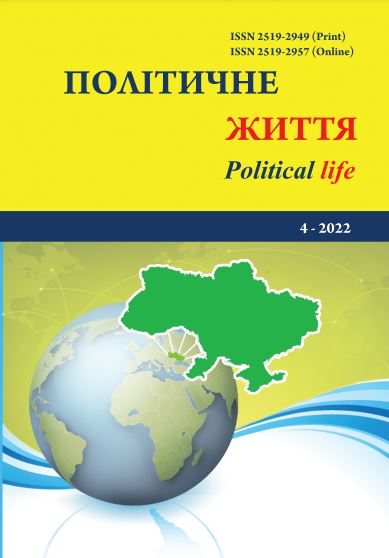Social media activity of the president of Ukraine in coverage of the russian-ukrainian war
DOI:
https://doi.org/10.31558/2519-2949.2022.4.8Keywords:
social media; President of Ukraine; Russian-Ukrainian war; social networks; digital platforms; information warfareAbstract
The article presents the results of a study of the activity of the President of Ukraine V. Zelenskyy in social media and its effectiveness and significance for superiority over the enemy in the information and communication space. Various definitions of the concept of "social media" are analyzed, which allows us to highlight the quintessence of most of them: social media is a synergy of Internet tools and mass media. The opinion is substantiated that the latest digital information and communication tools (social networks, blogs, microblogs, digital platforms, etc.) have carried out a media revolution, changing the model of public communication from vertical to horizontal and turning the average citizen from a passive consumer of information into an active communicator and creator of information content. The communication practice of the President of Ukraine is studied, first of all, in such social media as TikTok and Twitter. There are three leading elements that contribute to the effectiveness of V. Zelenskyy’s communication style in social media, namely, truthfulness, connection with the audience, and immediacy. In addition, the key narratives of the President of Ukraine are revealed, aimed at the domestic audience of the country and the international community. The opinion is argued that the active position of the leader of Ukraine in social media is an example that encourages coverage of the Russian-Ukrainian war in social media by other politicians, public figures, influencers, etc. The data of the report on digital news of the Reuters Institute for the Study of Journalism are also partially cited, which prove that in Western countries (Brazil, Great Britain, Germany, Poland, the United States) social media ranks second after television (with a slight gap) in obtaining information for their citizens regarding the course of the Russian-Ukrainian war, which indicates trust in this information and communication channel.
References
Айзексон В. Інноватори. Як група хакерів, геніїв та гіків здійснила цифрову революцію / пер. з англ. Д. Голомозда. Київ : Наш формат, 2017. 488 с.
Вахула Б. Соціальні інтернет-мережі, їхні функції та роль у формуванні громадянського суспільства. Вісник Львівського університету. Серія соціологічна. 2012. №. 6. С. 311–319.
Григорова З. Нові медіа, соціальні медіа, соціальні мережі – ієрархія інформаційного простору. Технологія і техніка друкарства: збірник наукових праць, 2017. № 3. С. 93–100.
Коноплицький С. М. Соціальні аспекти комунікації в мережі Інтернет: феноменологічний аналіз : дис. … канд. соц. наук : 22.00.01. Київ, НАН України, Інститут соціології, 2006. 154 c.
Почепцов Г. Социальные медиа как дружеские сети и как опасные ловушки Хвиля : веб-сайт. URL: https://hvylya.net/analytics/society/sotsialnyie-media-kak-druzheskie-seti-i-kak-opasnyie-lovushki.html. (дата звернення: 22.09.2022).
Самуляк О. В. Проблеми ідентифікації інтернет-ЗМК. Наукові записки Інституту журналістики. 2012. Т. 47. С. 82–84.
Шульга М. Система соціальних медіа у процесі інтеграції у маркетингові комунікації. Науковий блог. URL: http://naub. org. ua. (дата звернення: 28.09.2022).
Як аудиторія сприймає висвітлення у медіа новин про війну в Україні? – Нове дослідження Інституту вивчення журналістики «Reuters». веб-сайт. URL: https://www.nrada.gov.ua/yak-audytoriya-spryjmaye-vysvitlennya-u-media-novyn-pro-vijnu-v-ukrayini-nove-doslidzhennya-instytutu-vyvchennya-zhurnalistyky-reuters/. (дата звернення: 25.09.2022).
Kaplan A., Haenlein M. Users of the world, unite! The challenges and opportunities of Social Media. Business Horizons, 2010. Vol. 53 (1). P. 59-68.
Kietzmann J. H. Social media? Get serious! Understanding the functional building blocks of social media / J. H. Kietzmann, K. Hermens et all. Business Horizons. 2011. № 54 (3). Р. 241-251.

